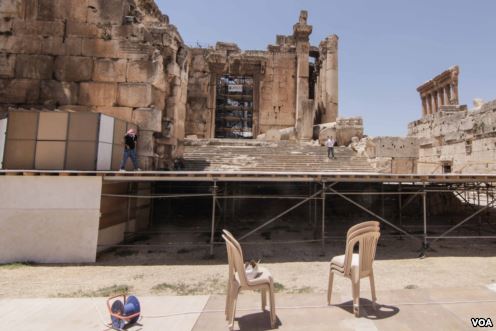
BAALBECK, LEBANON—
On a sweltering afternoon at one of the Middle East’s historic treasures, preparations are in full swing to bring visitors back to Baalbeck’s Roman ruins.
“Baalbeck International Festival has become a brand,” said Nayla de Freige, president of the renowned cultural gathering set to kick off next Friday in Lebanon’s Beq’aa region. “When you go outside Lebanon, many people know about it. It’s more than just a festival.”However, the festival’s fortunes have been mixed of late.
While global stars like Nina Simone and Sting have performed in the site’s ancient temples during the festival's six decade history, in the last two years performances have been held elsewhere due to the threat of Jihadists on the nearby Syrian border. Last year, events were moved mid-festival.
But this time the Lebanese Army has deemed the situation safe enough.
“We have a mission - something to say this year,” said De Freige. “Our role is to put Baalbeck back on the touristic map.”
No-Go Zone
Not just Baalbek, but the country as a whole, has become a no-go zone for tourists, put off by warnings from their embassies and reports in the media.
Once a staple of Lebanon’s economy, tourist numbers fell by 40 percent between 2010 and 2014 - including visitors from the Gulf.
“Many from the Gulf had big budgets, and would stay for 15 days, or even up to 60 days in the summer,” said Pierre Achkar, head of Lebanon’s Hotel Owners Association.
Lebanon’s tourism minister Michel Pharaon admits that the situation has been “terrible”.
“Sometimes [if you are a foreign tourist] you won’t hear about Lebanon for six months,” he said. “You won’t hear the positives, then you’ll suddenly see that a terrorist bomb has gone off, and you’ll look at the map and see Syria, and its problems.”
Cause to Hope
With refugees making up more than a quarter of the population, military maneuvers continuing along the border and political stalemate leaving the country without a president, Lebanon remains a country facing major hurdles.
But a period of relative internal calm in recent months has given many in the tourist industry cause to hope.
Beirut has been bomb-free this year; visitor numbers have stopped plunging and risen 25 percent over the past nine months.
Sensing an opportunity, the government is stepping up efforts to lure back visitors and change Lebanon’s image in the process.
Well-worn clichés posit Lebanon as a conflict-laden country where partying and beaches abound.
But this week, a new drive was launched to both target the Lebanese diaspora and diversify the country’s image by emphasizing its rural and cultural attractions in what Pharaon called “a new kind of tourism."
Martine Btaich, who works at the Lebanon Mountain Trail Association, is among those hoping to change perceptions.
Btaich said previous “sporadic” efforts at promoting ecotourism have become far more co-ordinated.
Highlighting a recent organized trek which drew hikers from around a dozen countries, she added, “It’s about countering the negativity conveyed about Lebanon, and offering an alternative Lebanon.”
Heightened Security
Pharaon told VOA the current campaigns and growth would have been impossible were it not for a tightening of internal security over the past year.
“With the security services and army doing a good job on the frontiers we have a space where we can build tourism,” he said, adding that any gains were still “fragile” in the face of potential security threats.
Achkar too expressed caution, claiming that for real progress to be made heavyweight tour companies abroad needed further persuasion that Lebanon was a safe place to send their customers.
However, both Pharoun and Achkar were optimistic.
“When it comes to recovery, Lebanon is very quick,” added Achkar, who said that the country was “fully booked” within ten days of the 2006 Israel-Lebanon war.
'Feels Completely Safe'
With the Syrian war dragging on, Lebanon is still far from “fully booked.”
Those dependent on tourists will continue to pray for relative stability, and seek to close the gap between how would-be tourists perceive Lebanon and the reality on the ground.
Strolling around the temples of Baalbeck not far from De Freige and her team of festival organizers, is Danish engineer Hans Brink.
Currently working in Lebanon, Brink is on a day trip to the ruins and is deeply enthusiastic about what the country has to offer.
“It’s great, and feels completely safe,” he said.
“I’ve been to Byblos [a Lebanese coastal town and tourist attraction], and I’ve been to Tripoli, and the nightlife is great too.”
What do his friends back home think?
“They say I’m crazy,” he responded, grinning.